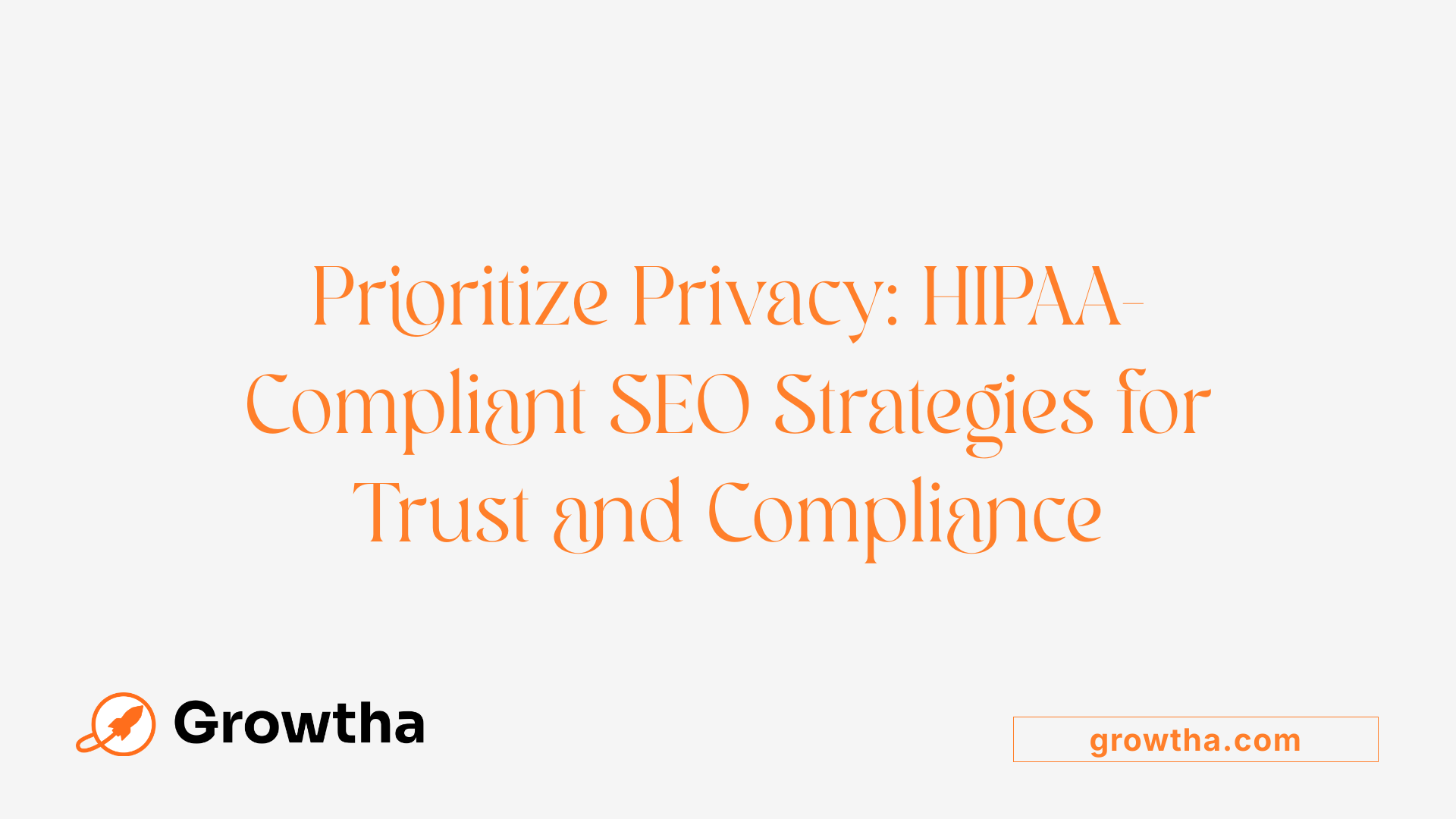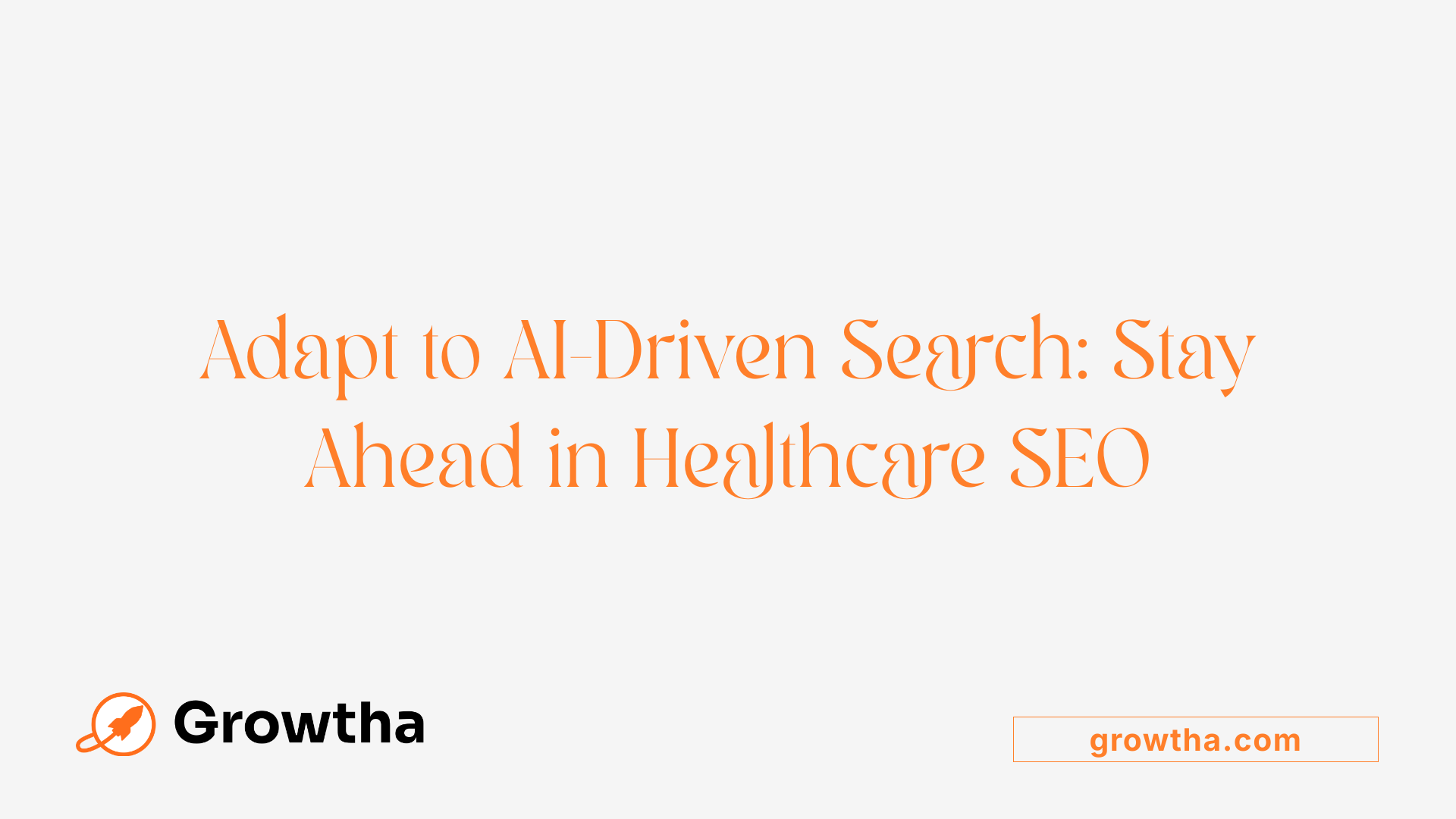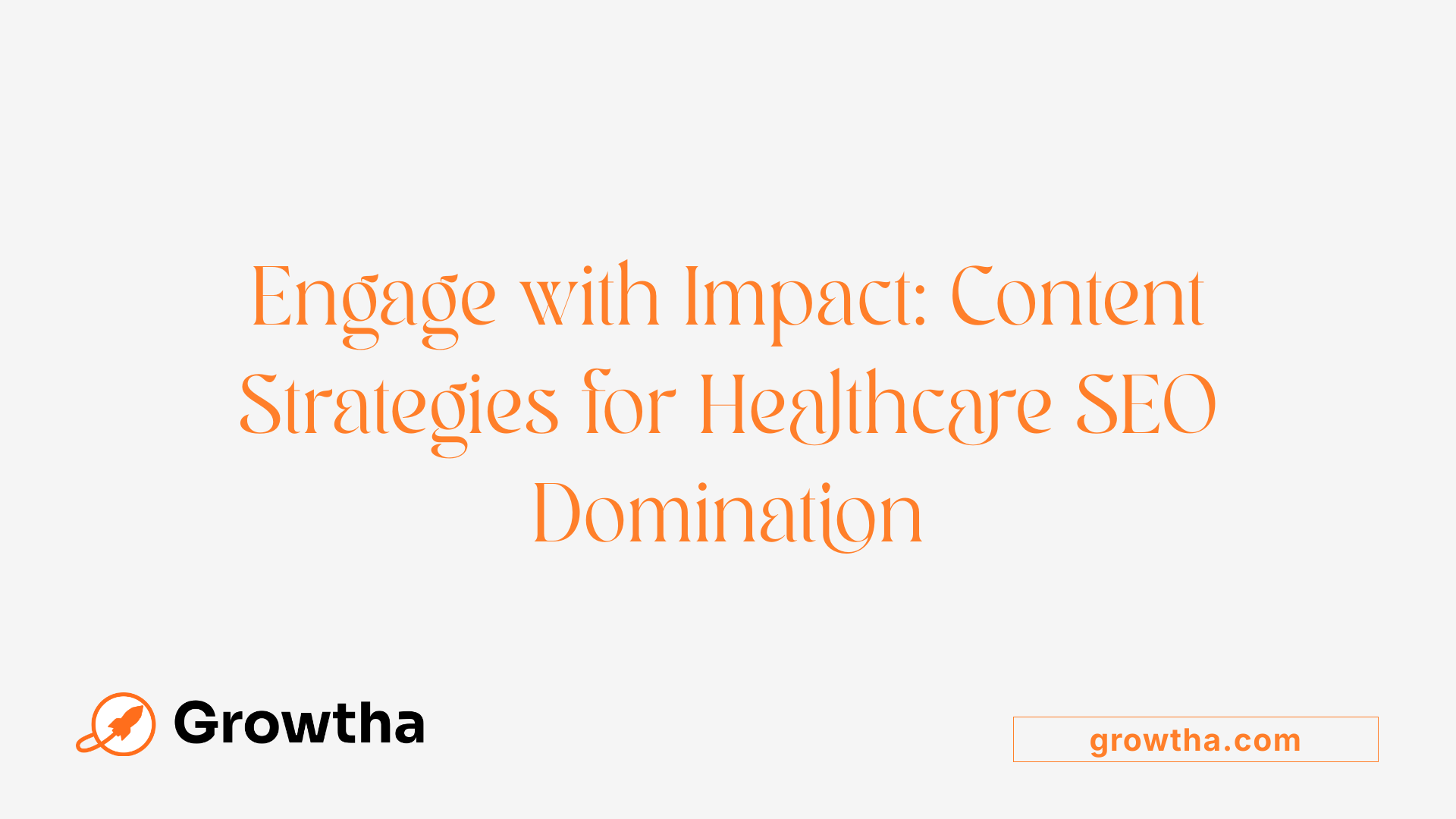Future Trends in Healthcare SEO
Shaping Tomorrow: Emerging Paradigms in Healthcare SEO


Future Trends in Healthcare SEO
Unlocking the Future of Healthcare Search Optimization
As digital health continues its rapid evolution, healthcare SEO strategies are expected to undergo significant transformation driven by technological innovations, regulatory changes, and shifting consumer behaviors. This comprehensive overview explores the key future trends, strategic imperatives, and technological advancements shaping healthcare search engine optimization in the upcoming years, equipping providers to stay competitive and trustworthy in the online landscape.
The Growing Significance of HIPAA Compliance and Privacy in Healthcare SEO

How are HIPAA regulations and enforcement shaping healthcare SEO strategies?
As healthcare organizations intensify their digital presence, compliance with HIPAA regulations becomes more critical than ever. The U.S. Department of Health and Human Services (HHS) has increased enforcement efforts, underscoring the importance of safeguarding patient data. This regulatory landscape compels healthcare marketers to adopt strict privacy practices to avoid penalties and maintain trust.
What role do HIPAA-compliant analytics tools like Compass by Wheelhouse DMG play?
Analytics play a vital role in assessing digital performance, but with sensitive health data involved, organizations must use HIPAA-compliant tools. Compass, developed by Wheelhouse DMG, exemplifies such solutions. It enables healthcare providers to analyze website traffic, user engagement, and marketing efforts without risking patient privacy breaches. These tools help in refining SEO tactics effectively while remaining compliant.
How does HIPAA influence data collection and content practices?
Strict privacy standards influence every aspect of data handling, from website analytics to content creation. Healthcare websites must ensure that personally identifiable information (PII) is not inadvertently collected or shared unless fully compliant. Content must be carefully reviewed and supported by qualified medical professionals, emphasizing accuracy and trustworthiness.
What does this mean for content marketing and consumer engagement?
Content marketing remains a cornerstone of healthcare SEO. Engaging, accurate, and authoritative content helps attract and retain patients. However, it must also respect privacy rules—using secure data collection methods and avoiding any disclosures that could violate HIPAA. This balance enhances credibility and helps cultivate patient trust.
Final insights
As SEO strategies evolve through 2024 and 2025, integrating HIPAA compliance with advanced analytics tools like Compass will be essential. This ensures that healthcare organizations continue to improve their search rankings and patient outreach without compromising privacy. Staying informed about enforcement trends and adopting privacy-first practices will be crucial for success in the future healthcare digital landscape.
AI's Integral Role in Healthcare SEO and Content Creation

How are technological advancements like AI, voice search, and mobile optimization influencing healthcare SEO?
The landscape of healthcare SEO is undergoing rapid changes driven by technological progress. Artificial intelligence (AI) plays a pivotal role in transforming how healthcare organizations develop and optimize their online presence.
AI enhances keyword research by analyzing large datasets to identify trending and relevant search terms, including long-tail phrases aligned with patient intent. It also streamlines content creation by generating high-quality, authoritative articles and FAQs, saving time while maintaining accuracy.
Predictive analytics powered by AI help forecast search trends and patient behaviors, allowing organizations to tailor their marketing strategies effectively. As search engines evolve with AI capabilities, Google’s understanding of search intent is becoming more sophisticated, favoring content that demonstrates experience, expertise, and trustworthiness.
Voice search is gaining prominence, especially as over 40% of U.S. adults use voice assistants daily. This shift encourages healthcare providers to optimize for natural language queries and conversational keywords, prioritizing FAQs and local phrases like "find a cardiologist near me."
Mobile optimization remains critical since most health-related searches happen on smartphones. Responsive designs, fast-loading pages, and accessible content are now fundamental to achieving high search rankings.
AI tools also facilitate structuring content for snippets, rich results, and multimodal content, which increase visibility in search results. For example, schema markup helps search engines surface detailed information about practitioners, services, and reviews.
To thrive in this environment, healthcare providers must blend traditional SEO practices with new strategies driven by AI, social media, video content, and structured data. Prioritizing authoritative, transparent, and engaging content is essential to meet algorithms’ evolving standards and improve patient engagement.
Emergence of AI-Driven Search Engines and Algorithm Changes

What potential antitrust actions against Google could impact healthcare SEO?
Google, dominating the search engine market, faces increasing scrutiny from regulators worldwide. Potential antitrust actions could lead to changes in how search results are ranked and displayed, especially affecting healthcare content visibility. These actions might result in a more level playing field, bringing alternative search platforms to prominence and encouraging diversification in digital marketing approaches.
How will the introduction of AI-driven search platforms change healthcare search rankings?
New AI-powered search engines and updates to existing algorithms are transforming how information is retrieved and ranked. These platforms leverage natural language processing and machine learning to deliver more personalized, context-aware results.
The impact on healthcare SEO is significant. Content will need to be more authoritative, experience-based, and aligned with new ranking signals focused on user intent. Healthcare providers should optimize for natural, conversational queries, especially for voice searches, and ensure their content adheres to quality standards like E-A-T (Experience, Expertise, Authority, Trustworthiness).
What does this mean for healthcare organizations aiming to diversify their search strategies?
As search engines evolve with AI integration and potential regulatory changes, healthcare organizations must diversify their digital presence. Relying solely on Google’s organic rankings may be insufficient.
Strategies include investing in multiple platforms, enhancing local SEO with Google Business Profile optimizations, creating multimedia content to increase engagement, and employing programmatic advertising and geofencing to reach targeted audiences. Staying informed about AI developments and algorithm updates will be crucial.
Emerging search competition and AI-driven platforms create both challenges and opportunities for healthcare providers to improve their visibility and patient engagement through innovative, compliant, and diversified SEO tactics.
| Aspect | Impact on Healthcare SEO | Strategies for Adaptation | Additional Notes |
|---|---|---|---|
| Search Engine Regulation | Potential for increased oversight and regulation | Monitor legal updates, diversify search channels | Aims to prevent monopolistic practices |
| AI-Driven Search Platforms | More personalized, semantic results | Optimize for conversational keywords, rich snippets | Focus on high-quality, authoritative content |
| Algorithm Changes | Emphasis on relevance, experience, and trust signals | Maintain updated, medically accurate content, structured data | Continuous adaptation essential |
| Diversification of Efforts | Reduced dependency on a single platform | Use local SEO, social media, paid ads, multimedia content | Enhances resilience against algorithm shifts |
By understanding these evolving dynamics, healthcare providers can better position themselves in a shifting digital landscape, ensuring continued visibility and patient trust in an AI-driven future.
The Strategic Use of Structured Data, Local SEO, and Digital Advertising
How do structured data, local SEO, and digital advertising influence the future of healthcare SEO?
Structured data, especially schema markup, is transforming healthcare SEO by helping search engines understand complex medical information better. Implementing schemas like MedicalOrganization and Physician allows healthcare providers to showcase detailed service descriptions, practitioner credentials, ratings, and reviews directly in search results. This leads to rich snippets, which are more eye-catching and can significantly increase click-through rates.
Recent studies reveal that about 92% of top search results across various industries use schema markup, underscoring its importance for visibility. For healthcare organizations, adopting these structured data formats enhances local SEO by accurately marking location data and review information, making practices more visible to patients searching nearby.
Local SEO tactics are equally vital. Optimizing Google Business Profiles with current NAP (Name, Address, Phone number) information, encouraging patient reviews, and developing local content help practices rank higher in “near me” searches. These efforts build trust and credibility, essential factors in healthcare decisions.
Digital advertising, particularly through platforms like Google Ads and social media, supplements organic SEO strategies. When integrated with structured data and local SEO efforts, paid campaigns become more targeted and effective, ensuring healthcare organizations reach the right audience at the right time.
By combining these techniques—structured data for enhanced visibility, local SEO for community reach, and digital advertising for targeted engagement—healthcare providers are shaping a search environment that delivers authoritative, accessible, and trustworthy information. This integrated approach supports better patient discovery, improved trust, and increased appointment bookings.
For more insights, search using phrases like "structured data local SEO healthcare 2024-2025." Adopting these strategies will be crucial for healthcare entities aiming to stand out in an increasingly competitive digital landscape.
Essential Strategic Guidance for Healthcare Providers
What strategic guidance can help healthcare providers adapt to future SEO trends?
Healthcare organizations need to proactively adapt their SEO strategies to stay ahead in a rapidly evolving digital landscape. One of the most critical aspects is ensuring compliance with regulations like HIPAA, which governs patient data privacy and security. Leveraging HIPAA-compliant analytics tools such as Compass, developed by Wheelhouse DMG, is vital for collecting insights without breaching privacy laws.
Incorporating advanced AI tools is increasingly important for creating high-quality, authoritative content, performing keyword research, and optimizing ongoing campaigns. While AI can streamline content production and enhance predictive analytics, human expertise remains crucial for maintaining accuracy, trustworthiness, and adherence to clinical standards.
Investments in technical SEO are equally essential. This includes optimizing website speed, implementing structured data schemas like Medical Organization and Physician markup, ensuring mobile responsiveness, and creating a logical site architecture. Local SEO strategies, such as optimizing Google Business Profiles, managing patient reviews, and using local keywords, help attract nearby patients actively searching for healthcare services.
Emerging trends like voice search optimization should not be overlooked. Using conversational long-tail keywords and FAQ content tailored for vocal queries can significantly boost visibility. Additionally, building a robust backlink profile from reputable healthcare sources enhances domain authority.
Monitoring performance through tools like Google Search Console and adapting to algorithm updates allow healthcare providers to refine their SEO efforts continuously. Staying informed about new regulations and technological advancements will be key for maintaining strong search presence and attracting new patients.
In summary, a comprehensive, compliant, and adaptable SEO approach—emphasizing content quality, technical health, local relevance, and emerging search formats—will position healthcare organizations for success in the future digital landscape.
This strategic guidance underscores the importance of integrating technology, compliance, and continuous learning to navigate the future healthcare SEO environment effectively.
Impact of AI, Voice Search, and Mobile Optimization on Future SEO

How are technological advancements like AI, voice search, and mobile optimization influencing healthcare SEO?
The rapid evolution of technology is reshaping healthcare SEO in profound ways. Artificial Intelligence (AI) helps organizations craft personalized and predictive content tailored to individual patient needs, making search results more relevant and engaging. AI-driven tools assist with keyword research, content structuring, and performance optimization, ensuring that healthcare websites meet the latest search engine standards.
Voice search is gaining popularity among consumers, with many seeking quick, natural language answers. Healthcare providers now need to optimize their content using conversational keywords and FAQs that match how people speak, not just how they type. This shift emphasizes the importance of accessible, easy-to-understand information suited for voice assistants.
Mobile responsiveness remains essential as the majority of health-related searches happen on smartphones. Ensuring fast-loading, mobile-friendly sites that meet Core Web Vitals standards improves visibility and keeps patients engaged. Google’s move to mobile-first indexing makes this a top priority.
Combining these innovations, healthcare organizations must adopt integrated strategies. This includes leveraging AI for personalized content, optimizing for voice with natural language queries, and maintaining mobile-friendly websites. Using structured data, multimedia content, and engaging technologies like videos enhances search relevance and user experience.
In summary, AI, voice search, and mobile optimization are shifting healthcare SEO from simple keyword targeting to a sophisticated, user-centered approach. Staying ahead requires blending traditional SEO techniques with advanced AI tools, ensuring authoritative and trustworthy content that complies with health regulations and captures the evolving search landscape.
The Future of Content and Engagement Strategies in Healthcare SEO

What role do content marketing and consumer engagement strategies play in the evolution of healthcare SEO?
Content marketing and patient engagement are becoming even more vital in shaping healthcare SEO. As digital consumers seek trustworthy, accurate, and personalized health information, healthcare organizations must deliver content that meets these expectations.
High-quality, relevant content helps improve search rankings by aligning with users’ search intent and providing valuable answers to common health questions. Regular updates are necessary because medical knowledge evolves quickly, and outdated information can harm both credibility and SEO performance.
Multimedia elements like videos, infographics, and interactive tools are increasingly used to make content more engaging and accessible. Videos, in particular, are highly effective for educating patients, building trust, and increasing time spent on websites, which positively impacts SEO rankings.
Focusing on personalized content allows providers to better connect with individual patients by addressing their specific needs and preferences. Tools like patient portals, targeted messaging, and tailored recommendations enhance user experience and foster loyalty.
Strategic deployment of content involves multichannel distribution—through social media, email campaigns, and content hubs—to reach diverse audience segments.
Content should also include compelling calls-to-action that motivate users to book appointments, subscribe for updates, or seek further information. Technical SEO elements, such as schema markup and site speed, ensure content is easily discoverable.
Analytics and regular audits help refine content strategies, ensuring information remains credible and aligns with consumer search behaviors.
Ultimately, by integrating high-quality content with engaging, personalized patient experiences, healthcare organizations can improve their search visibility, educate the public, and establish themselves as trusted medical authorities in an increasingly competitive digital landscape.
Adopting Multimedia Content and Video in Healthcare Marketing
What emerging SEO strategies and best practices are recommended for healthcare providers?
To stay competitive in the digital space, healthcare providers must adopt advanced SEO strategies that elevate their online visibility and build patient trust. Technical improvements such as enhancing website speed, ensuring mobile responsiveness, and making sites accessible are foundational. Deploying structured data, schema markup, and rich snippets enables search engines to better understand healthcare content, which can improve ranking and increase click-through rates.
Local SEO remains vital; maintaining consistent Name, Address, and Phone Number (NAP) information, optimizing Google My Business profiles, and actively encouraging patient reviews can significantly boost local search positioning. Creating high-quality, patient-focused content—including informative blogs, FAQs, videos, and downloadable resources—helps establish authority and meets the specific needs and queries of patients.
Incorporating voice search optimization by using natural language and long-tail keywords is becoming increasingly necessary, especially as voice assistants grow in popularity. Reputable backlinks from medical authorities also enhance credibility.
Finally, continuous performance tracking with analytics tools allows healthcare providers to refine strategies, monitor search rankings, and adapt to algorithm updates, ensuring sustained growth in a competitive environment.
The Role of Multimedia and Video Content in Patient Engagement
How do regulations, search engine algorithms, and industry changes impact healthcare SEO strategies?
Regulatory requirements like HIPAA (Health Insurance Portability and Accountability Act) and FDA guidelines play a crucial role in shaping healthcare SEO practices. These regulations demand that content remains accurate, privacy is protected, and marketing claims are substantiated, ensuring patient information is secure and trustworthy.
Search engine algorithms such as Google's Core Web Vitals, E-A-T (Experience, Expertise, Authority, Trustworthiness), and the latest updates emphasize the importance of high-quality, authoritative content. These ranking factors prioritize websites that provide accurate, well-maintained, and user-oriented information, requiring healthcare providers to produce content backed by medical experts and regularly updated with the latest research.
Industry changes, particularly the adoption of AI technologies like ChatGPT, influence how healthcare content is created and optimized. AI tools assist in keyword research, content generation, and predictive analytics but must be used responsibly to maintain compliance with privacy regulations. As healthcare practices evolve, SEO strategies must incorporate multimedia elements like videos and infographics to engage patients effectively.
Failure to adapt to these evolving requirements can lead to penalties from search engines, reputational harm, and diminished online visibility. Thus, successful healthcare SEO involves a balance of regulatory compliance, technical optimization, and responsiveness to industry shifts, ensuring trustworthy information reaches patients and builds lasting trust.
Navigating the Future of Healthcare SEO
The landscape of healthcare SEO is poised for profound transformation, driven by technological innovation, evolving regulations, and shifting patient expectations. Organizations that proactively adopt AI-driven strategies, prioritize compliance, and leverage structured data, local SEO, and multimedia content will be best positioned to enhance visibility and trust. Emphasizing personalized, engaging, and authoritative content tailored for mobile, voice search, and user experience will be essential. By embracing these future trends and industry shifts, healthcare providers can ensure their digital presence remains robust, relevant, and competitive in an increasingly crowded digital health ecosystem, ultimately improving patient outcomes and organizational success.
References
- Healthcare SEO: Complete Industry Guide for 2025
- Healthcare SEO: The Ultimate Guide to Medical SEO in 2025
- Healthcare SEO trends for 2025: Use them to stay competitive - Tebra
- 9 Biggest Healthcare Marketing Trends in 2025 with Examples
- Healthcare SEO: Essential Trends and Strategies for 2025
- How to Adapt to Trends Impacting Healthcare SEO and Content ...
- 11 Healthcare Marketing Predictions for 2025
- 7 Key SEO Trends Impacting Healthcare Providers in 2024
- 7 Key Healthcare SEO Trends For 2025 Success - Syspree
- Trends in Healthcare SEO to Watch in 2024 | Hospital Careers







